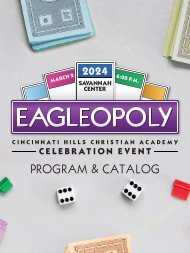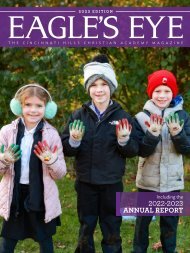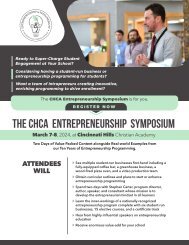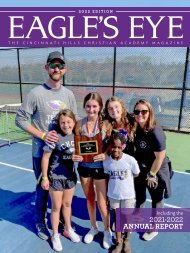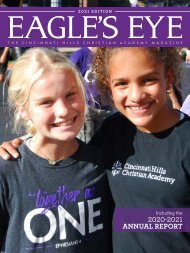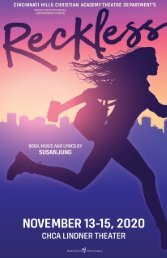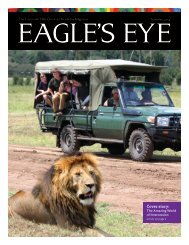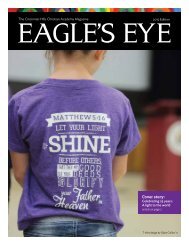Eagles Eye 2019 including the 2018/2019 Annual Report
The 30th Anniversary edition of Cincinnati Hills Christian Academy's Eagles Eye and 2018-2019 Annual Report
The 30th Anniversary edition of Cincinnati Hills Christian Academy's Eagles Eye and 2018-2019 Annual Report
Create successful ePaper yourself
Turn your PDF publications into a flip-book with our unique Google optimized e-Paper software.
FROM THE<br />
HEAD OF SCHOOL<br />
Having two sons in <strong>the</strong> world of business “startups” has been both challenging and<br />
fascinating at <strong>the</strong> same time. These boys have taught me that <strong>the</strong> world in which<br />
<strong>the</strong>y live is nothing like <strong>the</strong> world I was preparing to enter in my secondary school<br />
years. Things have certainly changed. In fact, <strong>the</strong> pace of change in educational<br />
pedagogy has been increasing for years and <strong>the</strong>re is no end in sight.<br />
RANDY BRUNK<br />
CHCA Head of School<br />
As educators in <strong>the</strong> 1990s, we could sense things were changing; but we could<br />
barely foresee beyond <strong>the</strong> horizon. Technology was descending upon school<br />
classrooms introducing new possibilities, but it was not necessarily modifying <strong>the</strong><br />
curriculum or <strong>the</strong> way we taught. We knew adjustments were imminent, but we<br />
were scrambling to best understand <strong>the</strong> how, what, and why. And not surprisingly,<br />
it was actually <strong>the</strong> students who taught us <strong>the</strong> answers to <strong>the</strong>se questions. They<br />
were starting to use devices to communicate, research, create, game, learn, and so<br />
much more. The most nimble and tech-oriented teachers watched and learned<br />
and <strong>the</strong>n began leveraging student interest and engagement to <strong>the</strong>ir advantage.<br />
That spurred even greater usage and clarity for us all, and we sensed by <strong>the</strong> early<br />
2000s, this fast-paced change would become <strong>the</strong> norm and things were forever<br />
changing. It was clear this was not just ano<strong>the</strong>r fad (like open classrooms) as<br />
fundamentally new ways of learning and student engagement were coming to life.<br />
At CHCA, we made a strategic decision years ago to embrace this change and<br />
teach through it. Several years ago, a middle school teacher by <strong>the</strong> name of Lance<br />
Webel taught me something that guides my thinking to this day. At <strong>the</strong> time, we<br />
were confronted with <strong>the</strong> reality of <strong>the</strong> social forum, “MySpace”. It was <strong>the</strong> first<br />
widely used social media platform by students of that day. Parents and teachers<br />
alike sounded alarm bells as kids often used it improperly and were sometimes<br />
<strong>the</strong> victims of ano<strong>the</strong>r student’s misuse. At <strong>the</strong> time, I asked Mr. Webel to help<br />
us to essentially shut it down. He snickered and said that was simply futile. He<br />
proceeded to describe a much wiser approach...“Don’t make it taboo, teach <strong>the</strong>m<br />
how to use it properly.” That approach has become our refrain as <strong>the</strong> changes<br />
continue to come with multiple social media and digital platforms at play – and<br />
platforms that are not going away anytime soon. We find that philosophy to<br />
largely work best, and find ways for positive reinforcement when we can.<br />
Now, I recognize that not all uses of technology are considered good. We all<br />
have abundant horror stories I am sure. But also recognizing that most of what<br />
is coming down <strong>the</strong> pike is going to make its way into our children’s lives, with or<br />
without us, we need to be consistent in teaching good stewardship and healthy<br />
use. Thomas Friedman, in his best-selling book, “Thank You For Being Late” says<br />
something very interesting about this conundrum. He encourages us to stay on<br />
top of all that is happening and be a voice of reason in <strong>the</strong> midst of <strong>the</strong> confusion.<br />
He likens it to how professional kayakers approach rivers. Professionals actually<br />
paddle <strong>the</strong>ir boat forward to gain control over where <strong>the</strong>y go in fast-paced rapids.<br />
Our tendency as amateurs is to try to slow <strong>the</strong> boat down to get more control. It<br />
is actually better to stay ahead of <strong>the</strong> water ra<strong>the</strong>r than letting <strong>the</strong> water take us<br />
wherever it wants to go, which may not be a safe route.<br />
4




